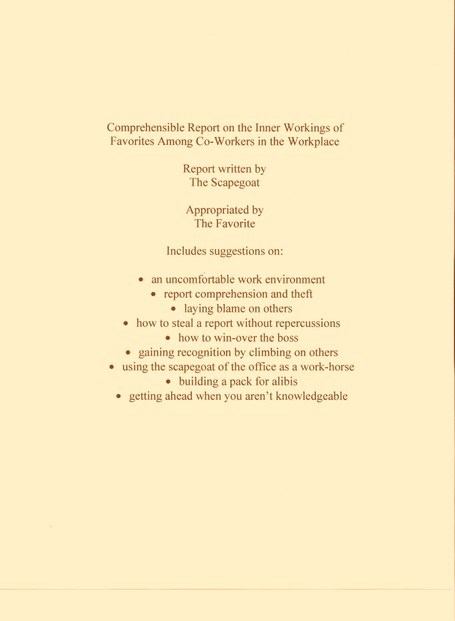
Are you tired of being the scapegoat at work?
by cherylone
How to deal with boss favorites and when to know it is time to leave the company.
How many times has this happened to you?
How many times have you worked your rump off gathering data and working out the figures and such only to have some brown-nosed geek steal the final product or lay claim to the majority of the work? How many times have you done the best job possible and watched others receive the reward? How many times have been blamed for something that went wrong when you either didn’t do it or were told to do it by the person blaming you? Let’s face it, we all find ourselves in that type of situation a time or two. And we never seem to recover from the loss because we are so angry, we can’t focus on the big picture.
 Stolen Report Created by cherylone |
How can such things be happening in the work place?
How can the boss be so blind?
Easy, they are a favorite of the boss. They can do no wrong in the boss’s eyes and no matter how much proof you can produce, the boss can only see their favorite’s side. The favorite whispers in their ear when no one is around telling them that you did this or someone else did that and never once taking credit for anything unless the boss likes it, then it was all their doing and even their initial idea. Sadly, the employees are not the only ones who suffer under such situations--so does the company! When the boss puts his/her favorite ahead of all others, then the company does not benefit from the knowledge and expertise of those who could truly make the company soar.
I've been there......
I believe we all have at one time or another......
And I know how it feels to be the scapegoat in an office of people who feel they are superior to you and can take what you do and claim it or claim the reward for it. I have experienced bosses telling their bosses that they worked out a new program for something when I was the one who not only suggested the program, but also worked out all the details and helped to incorporate it into the routine of the company. I have seen mistake after mistake done by others who then ‘privately’ tell the boss I did it. I have seen people blatantly tell the boss right in front of me that they tried to correct my error but I just kept doing it and now it is out-of-hand. I have been the object of insult and ridicule because reports I did were stolen out from under me and items I worked on were given to others for reward.
Do you fight the boss's favorite?
Once you discover that the boss has a favorite, you might as well give up the fight because you will not win. The worse bosses with favorites are the ones with more than one. These groups of favorites tend to gather together like a pack of wolves howling at the moon. These people work together to keep you out of the lime light no matter what you do. They are fast to claim good things and quick to lay blame on others and they ‘play the witness’ for each other leaving you, and anyone else they have targeted out in the cold. Eventually you will lose your job because you will never be able to prove to the boss that you are good at what you do.
Are there alternatives that you can do?
Is there hope for you?
There are alternatives; however they are difficult and often costly. You can take your case to a higher authority, but remember that the boss has always gotten there first. He/she will have told their boss all about your failures and your attempts to claim the favorite’s work. He/she will have pointed out your errors (especially the ones you didn’t actually do but were blamed for) and they will point out the problems their favorites have been having with you. By the time you get in to give your side of the story, their boss has usually been prejudiced against you and it will take more than a few words from you to prove otherwise. I strongly suggest that you take the time to discover just how tight the ‘pack’ is before you try to win your case. Talk to co-workers and get their opinion; often they will be the first to tell you that the boss has favorites (and the first to deny ever saying such a horrid thing). But you can use the information to work out your plan of approach.
There is hope, especially if you can show the big boss your drafts and notes and prove that they are yours. But be careful how you approach it. If you walk in and immediately begin laying blame on others; even if the boss is not prejudiced against you, he/she will begin to believe that you are the trouble-maker.
Discuss your successes with confidence to show it is yours.
Talk to the boss about your projects and the things you have done with confidence and do not try to blame anyone for your failures or it will be as if the sky is falling. By accepting what you have done wrong, you are telling the boss that you are willing to accept your errors rather than blaming them on others. This will give them the idea that the others are the problem, not you. Also, if you can prove that you did not make the mistakes you have been blamed for, you can also prove that you are as good as your reports seem to claim.
This becomes a very fine line!
Don't cross the line in your efforts to show the boss what you can do!
Tact and careful wording are the key to any meeting of this nature. Above all, DO NOT POINT YOUR FINGER AT ANYONE! In other words, don’t say things like “Ray told you that he wrote this report, but I was actually the one who wrote it and I’d like you to know that I was the good guy, not him.”
Be careful and tactful......
Telling the boss that you are good while showing that the others are to blame for errors can make you appear to be the culprit, but this is exactly what you have to do to show you are not the problem. Carefully chose your words. Carefully point out the facts. You could say, “I just wanted to go over my notes from my last report with you in case there was anything that I might have missed when I compiled the final figures.”
Here are a few suggestions that can help you rise above the scapegoat level.
- When someone blames you for their mistakes stick up for yourself, and then let it go. The real culprit will, eventually, be discovered and when they are, they will suffer multiple consequences.
- Discuss concerns with your boss in private when you feel you are being blamed for things you did not do. When you discuss the items with your boss, make sure you have specific examples along with dates and witnesses, but be careful not to lay blame on anyone.
- Don’t immediately run to the boss! This makes you appear to be a ‘cry baby’ in the eyes of fellow workers and your boss. Wait until the situation has become a real issue while carefully and privately recording each episode.
- Try not to complain to your fellow workers, even if they are complaining to you. This creates a difficult atmosphere because they will often run to the culprit and tell them what you said. Instead, shrug and let them know that you are confident in your work and your abilities.
- Be careful who you trust. Many appear to be friends and then run to the boss to tell them how much you are complaining or acting selfish.
- Be sure that you are careful to do exactly what you are supposed to do at all times no matter what. Even if others are taking shortcuts, don’t do the same unless your boss insists that you follow suit. That way, when the boss comes to see how things are going, you will be doing things correctly and everyone else will have to scramble to get it right.
- Show your knowledge and abilities during meetings whenever possible without ‘bragging’ and showing off. For example, when the boss asks about a program that has been instilled, you can speak up about it, but you can also let others stumble and mumble about the issue before speaking up and giving facts as you know them. This helps to show that they are not as well-versed as they would like the boss to think that they are.
- Never try to put the culprit down or make them appear stupid! This only belittles you in the eyes of others. Instead, make your abilities known subtly.
- Be prepared, sometimes you cannot make a difference no matter what you do because the culprit is a favorite. In this case, you may have to make the difficult decision to either remain and suffer or quit and find a better job elsewhere.
Here are a few suggestons that can help you when you are a victim of work/product theft.
- Take the time to store all of your research, notes, and drafts in a safe place so that when the culprit tries to say they did the work and you just put your name to it, you have the proof you need to correct their error.
- If you are the subject of continuous product theft, do something that you know is incorrect, but is minor and hard to detect. For example, forget a “(” about halfway into the report. When you are questioned as to whether you did actually do the work, suggest the error before you open the report and then point it out.
- When a person continues to publically claim your work, smile and casually ask them how they reached any conclusions that are in the work. When they stumble over the answer, everyone will know they didn’t create the report; especially if you can quote a conclusion that you are asking them to explain.
- Personally hand your completed work to your boss. When they ask why, you can explain that you wanted to make sure they received the corrected copy.
- Give everyone concerned with any work you are doing copies of the completed work. That way they already have the work that the other person is trying to claim.
- Make it a point to quote portions of your work when discussing it in meetings. Someone who did not write the report would not be able to quote it without having it open and in front of them.
- Discuss the work with the culprit as if you were honestly trying to get their ideas that helped them to reach their conclusions. This will show that they do not have the entire information contained in the report.
- As stated above, be prepared, if the culprit is a favorite, you will not be able to get ahead or to prove your abilities. In this case, you may have to make the decision to leave the company and seek employment elsewhere.
Sadly, there are always favorites in the work place.
Sometimes they are just someone the boss likes, but sometimes they are the ones claiming everyone’s work while doing absolutely nothing. When you find yourself in such situations, be careful how you approach it. Feel out the boss and feel out your co-workers. Discover how tight the favorite is BEFORE you take the time to complain. And above all, continue to do the things you do best! Eventually, the boss will see you doing your job and will begin to discover the truth (unless, of course, their favorite is too close to them and then the effort will be wasted until you are gone).
You can smile, because they will see the difference.....
When you leave a company that has shown favorites and that you found you could not prove otherwise, smile as you walk away. Because the person who was claiming your work will get a true wake-up call when the boss asked them to produce more of the same and they can’t even come close. Then you might have the boss on the phone begging you to return---talk about payback!
Scapegoat as defined by Wikipedia...
Have you ever been subject to a favorite in the workplace?
You might also like
Planning for Grad SchoolHow to search for the best academic institution re your professional goals an...
How to Write Publishable Academic ArticlesGetting academic articles published is not an easy task. I give you the basic...








 Fruit and vegetable juice or whole fruits and vegetables, which is better for youon 04/23/2013
Fruit and vegetable juice or whole fruits and vegetables, which is better for youon 04/23/2013
 How to use memory wire to create jewelryon 12/19/2012
How to use memory wire to create jewelryon 12/19/2012
 The Spriteon 11/27/2012
The Spriteon 11/27/2012
 How to keep your feline companions safe and content during the holiday seasonon 11/10/2012
How to keep your feline companions safe and content during the holiday seasonon 11/10/2012


Comments
Boy do you have that right. Thanks for stopping by and commenting.
It's strange. the whole corporate economy is based on a feudal obedience to those "above"; which is in fact utterly derogatory to the success of the corporation itself, except a tiny few. it's like being enslaved to a group of gangsters. The thing is...as Napoleon said, "the surest way of living a life of poverty is to be a good man."
ethelsmith, I hope you will never have to suffer through this sort of thing once you retire. Enjoy that retirement! Thanks for stopping and commenting.
Useful wizz. I am almost retired and still find the politics of work a pain. Sometimes you just have to go with the flow or even move on. Good luck